How to prepare for UPSC Civil Services Examination? PDF Download
Clearing UPSC Civil Services Exam is the dream of millions. Some candidates achieve success in this exam with relative ease while many others toil day and night wondering how to tackle the prestigious exam.
The IAS exam is not only challenging in terms of the length of its syllabus, but it is also daunting because of its highly unpredictable nature.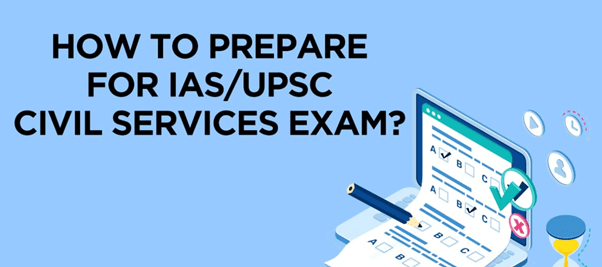
Why did EduRev make this guide?
- We wanted to answer the question "How to Prepare for UPSC" once and for all in the best / perfect way possible.
- Since students waste a large amount of time, effort, and money while preparing for UPSC just because of lack of the right direction/guidance. We believe it will be very very valuable for every UPSC aspirant.
- This guide was made to teach in a guided way so that you can clear your UPSC exam with the least amount of time, effort, and money spent, by just making sure you Study What Matters.
If you are one of those who aim to clear this prestigious examination but are confused about the strategy and needs a kickstart for your UPSC preparation, this article is a perfectly UPSC Preparation Guide that includes everything you need to know about “How to Prepare for UPSC Civil Services Examination” & is made by EduRev experts with interviews with their following students: Anudeep Durishetty (AIR 1, 2017), Srushti Deshmukh (AIR 5, 2018), Junaid Ahmad (AIR 3, 2018) and Akshat Jain (AIR 2, 2018).
Special thanks to Divey Sethi (IRS, AIR 296) and Bhupesh Satija (IRS, AIR 286) for reviewing final drafts.
How to prepare for UPSC?
This section aims at helping aspirants devise a well-planned preparation strategy for the upcoming UPSC exam. Let’s have a look at the full-proof STEP by STEP preparation strategy for preparing for the Civil Services Examination.
Step 0: Before you begin UPSC Preparation
Step 1: Decode the UPSC Exam Pattern
Step 2: Build Your Foundation: NCERTs
Step 3: Strengthen Your Foundation: Standard Books
Step 4: Read Newspaper & Practice Current Affairs
Step 5: Subject-wise Preparation
Step 6: Revise Repeatedly
Step 7: Attempt Mock-Tests
Step 8: UPSC Mains Preparation
Step 9: Optional Subject
Step 10: UPSC Interview
Conclusion: The basic mantra for success in UPSC CSE
Step 0: Before you begin your UPSC preparation
- Set goals and devote time effectively: Before starting your preparation, it is important to prepare yourself mentally and physically for the examination.
Make a Timetable: Firstly, to become an IAS officer, it is necessary to be like an officer with a well-organized daily routine. Set proper deadlines, and you would work better and complete the syllabus faster.
Make a Plan: Planning is equally important as studying. Plan how to study. Focus on micro planning i.e. make daily plans, set weekly targets and make a broad vision for the entire month.
Why UPSC: Lastly, ask yourself why you want to be an IAS officer because this will become the most important step by the time you reach interview.
Akshat Jain (AIR 2, 2018) gave 2 prelims. While preparing for the first prelims he had studied well but ended up just short of one mark from qualifying prelims because of not having a strategy, and had to wait another year. He was unable to crack how to attempt the paper but he was having knowledge. Hence, combining knowledge and strategy to crack the paper is important.
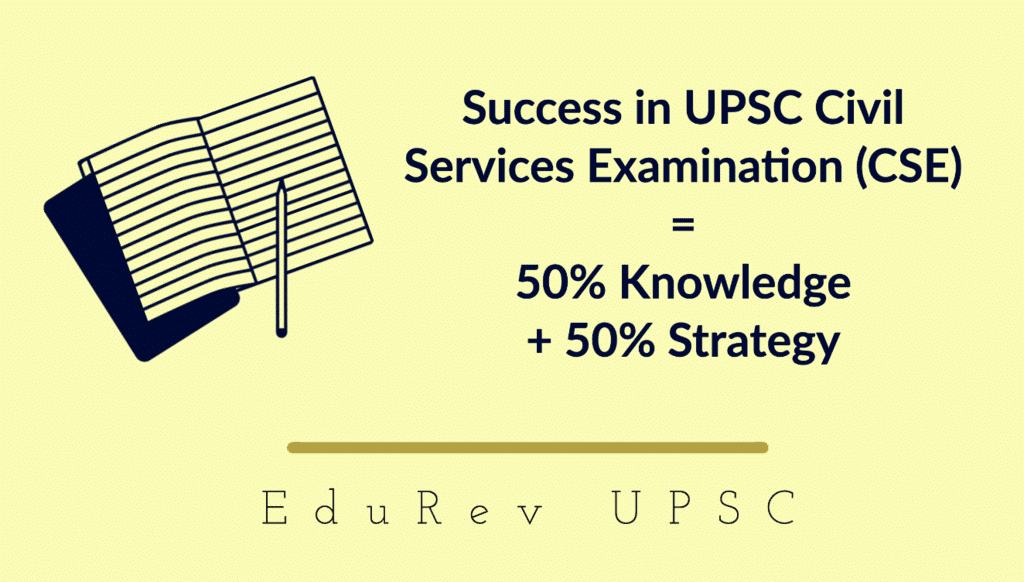
Step 1: Decode the UPSC Paper Pattern
It is very important to know the exam, what it is all about, and what all comes in it well enough before starting the preparation for it.
- Acquaint yourself with the exam syllabus, exam pattern, exam timeline, and Find the Detailed syllabus here and other stuff from the official notification of UPSC.
- Analyze the previous year’s papers and get a broad understanding of what is actually asked in the exam. You can attempt and analyse from the course UPSC Previous Year Question Papers
- Going through the above two points dedicatedly will save a considerable amount of time through your preparation journey.
Step 2: Build Your Foundation: NCERTs
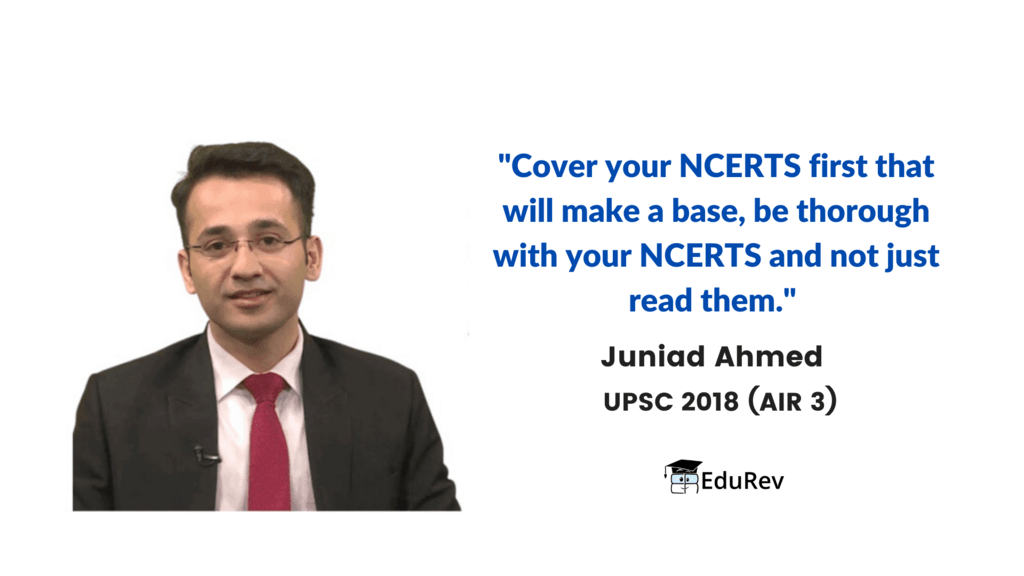
The NCERT books are considered as the basic reading books to build the base of the Civil Services Examination. It covers all topics which are important and gives us crystal clear conceptual clarity.
- Refer to NCERTs of all subjects.
- Read them at least twice before making notes, and then read NCERT summaries available at various sources.
- Prepare your notes alongside these summaries and save your time!
- You can refer to this document How to study NCERTs for UPSC Preparation with EduRev App? to kickstart your preparation from NCERTs.
Step 3: Strengthen Your Foundation: Standard Books
It is very important to read important books for the respective subjects of the UPSC IAS Exam syllabus. Follow standard books only to make your concepts stronger.
- Go through Important books for UPSC Prelims and Mains recommended by IAS toppers.
- Read the books at least twice and then make your handwritten notes to be used for answer-writing practice at the later stage.
- You can go through summaries, MCQ tests, video lectures of these important books in order to get a clear understanding of various advanced concepts.
- Check out the summaries & MCQ tests of various reference books like Spectrum for Modern History, G.C. Leong for Geography, M.Laxmikanth for Indian Polity, Ramesh Singh for Indian Economy, Nitin Singhania for Indian Art & Culture (History), Shankar IAS for Environment, Satish Chandra for Medieval History, RS Sharma for Ancient History & others in the course: Famous Books for UPSC Exam (Summary & Tests)
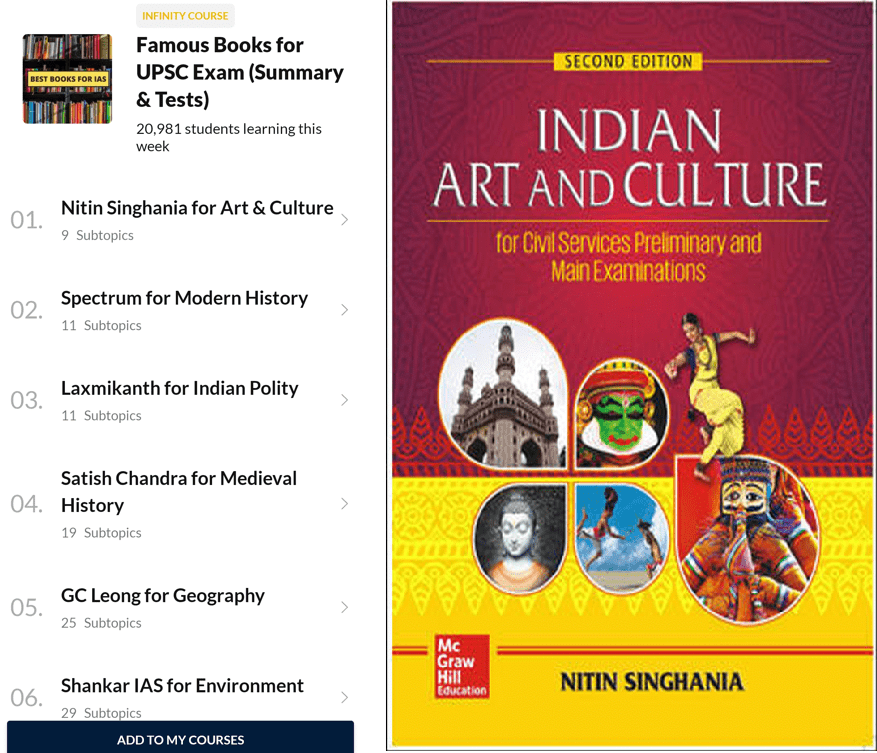 EduRev's Course of Famous Books offering summaries & tests
EduRev's Course of Famous Books offering summaries & tests
Step 4: Read Newspaper & Practice Current Affairs
Current Affairs play a significant role in UPSC Civil Services Exam preparation as the dynamic questions appear in all three stages of the examination- Pre, Mains, and Interview.
- Develop the habit of newspaper reading – particularly editorials and the op-ed page. Must refer to government monthly magazines like Yojana and Kurukshetra
- Reading The Hindu/ The Indian Express is advised. You may also start listening to All India Radio news analysis and Rajya Sabha TV discussions (Eg: Big Picture). You can also refer Current Affairs & Hindu Analysis: Daily, Weekly & Monthly.
- Follow reliable news sources mentioned above and read those sources coherent and systematic manner.
While-Reading Newspaper be selected news should be read, that is related to the news article with the syllabus, then study the article carefully and comprehensively.
Prepare your own notes that too, subject-wise. Create own flowchart, mind maps in notes, hence revision will be easy.
Revise notes periodically to maximize your potential to score more marks in each examination stage.
Refer to doc: How to Study Current Affairs for UPSC Preparation with EduRev App? and prepare well.
Step 5: Subject-wise Preparation Strategy For IAS Exam
Below is the subject-wise strategy on How to prepare for IAS exam seamlessly. Follow the best practices and the best strategy in order to prepare for this prestigious exam and ensure your selection.
1.
HistoryAnalyzing the pattern of previous years' questions reveals that while the number of questions has been declining, the level of difficulty is increasing.
- The questions in recent years have been asked from previously untouched areas. To ace this section, smart work is required.
- One should attempt the exam smartly too and should not waste unnecessary time on questions that are very tough. Leaving questions is art too in the IAS exam.
- You can go through the following documents and prepare yourself to crack the subject.
1. Syllabus, Booklist & Strategy to study History for UPSC - CSE Prelims
2. How to study History using the EduRev App?
2. Geography
This is one of the most vital sections in the Preliminary examination, which covers a good amount of questions.
- A new dimension to the Preliminary examination is a set of questions related to the Environment.
- One should be aware of the developments associated with Ecology and Environment-related issues; and also the various initiatives and conferences which have been held, especially those for preserving the biodiversity and ecosystem of the country and the world.
- For Geography, a proper reading of NCERT textbooks on Geography (from VI to XII) along with Goh Cheng Leong and a regular study of the Atlas is more than sufficient.
- You can go through the following documents and prepare yourself to crack the subject.
1. Syllabus, Booklist & Strategy to study Geography for UPSC - CSE Prelims
2. How to study Geography for UPSC with the EduRev App?
3. Indian Polity
Indian Polity encapsulates the entire constitutional framework and how our political system works. Indian Polity is one of the most important subjects for the UPSC Civil Services Exam.
- In recent years the importance of government policies has increased tremendously both in the Preliminary and main examination.
- The trend is expected to continue. The questions are more or less straightforward, which can be easily answered after careful study. This makes the subject important from UPSC's point of view.
- You can go through the following documents and prepare yourself to crack the subject.
1. Syllabus, Booklist & Strategy to study Indian Polity for UPSC - CSE Prelims
2. How to study Indian Polity using the EduRev App?
4. Environment
Questions related to the Environment are a new dimension to the Preliminary examination.
- One should be aware of the developments associated with Ecology and Environment-related issues.
- One should also be aware of the various initiatives and conferences which have been held, especially those for preserving the biodiversity and ecosystem of the country and the world.
- You can go through the following documents and prepare yourself to crack the subject.
1. Syllabus, Booklist & Strategy to study Environment for UPSC-CSE Prelims
2. How to study Environment for UPSC using the EduRev app?
5. Indian Economy
In the last few years, there has been a significant shift in this section in the pattern of questions. In recent times, Most of the questions are contemporary in nature but require a proper understanding of static areas of the Indian Economy too.
- Most of the questions in this area are from the Indian Economy but one also has to keep abreast of International Economics that has its bearing on India (for example, the recent trade war and its impact on the Indian market).
- You can go through the following documents and prepare yourself to crack the subject.
1. Syllabus, Booklist & Strategy to study Indian Economy for UPSC - CSE Prelims
2. How to study Indian Economy for UPSC using the EduRev app?
 |
Download the notes
How to prepare for UPSC Civil Services Examination?
|
Download as PDF |
6. Science & Technology
For students from Arts background, this section is always a nightmare. But a basic understanding of Science, especially thorough coverage of NCERTs, can be of great help in solving most of the questions.
- Questions related to current developments in science and technology are asked in Prelims.
- However, it is important to have a theoretical understanding of the static syllabus of the subject in order to write effective answers in the UPSC CS(Main) examination.
- You can go through the following documents and prepare yourself to crack the subject.
1. Syllabus, Booklist & Strategy to study Science & Technology for UPSC-CSE Prelims
2. How to study Science & Technology for UPSC using the EduRev app?
Step 6: Revise Repeatedly
It is not how much you know that matters but what you write on paper that the examiner can evaluate. So, make answer writing a regular feature of your IAS preparation.
- Once you have completed a subject from the NCERT as well as standard books, then you can start practicing answer-writing from Essay Writing course on EduRev.
- Candidates have to answer the questions quickly and effectively and in minimum words. This is not possible without adequate answer writing practice.
- At this stage, it is also important to incorporate consistent revision. You should keep your weekends free for a dedicated revision of whatever new you’ve learned during the week.
- You can revise from the Crash Course for UPSC aspirants course on EduRev too.
Step 7: Attempt Mock Tests
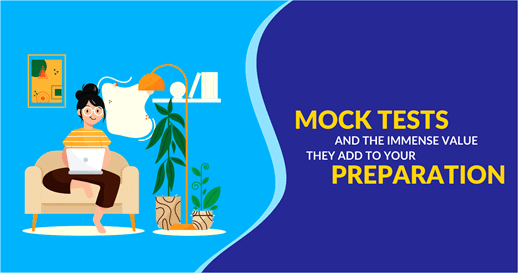
Mock Tests which are scientifically designed in the exact pattern of actual UPSC examination helps in mastering the art of elimination techniques and other hacks to clear the examination. The more you solve Mock tests the more these hacks get ingrained into your muscle memory
- Sit for an actual exam-like mock test at the same time and then analyze your performance.
- Check your weak areas and brush up on the concepts that you may have missed.
- It will not only help you in anxiety management during the actual exam but will also prepare you extremely well for the exam!
- Practice one mock test daily in the morning because the exam will be in the morning and your brain will work faster.
- Try to join test series like the one at EduRev which you can give at any time you want and not an external schedule so that you are able to practice / attempt whenever you want.You can attempt Mock Tests regularly from the course UPSC CSE Prelims Mock Test Series. Attempt more and more tests and ace your preparation!
Sectional tests
- Focus equally on sectional (initially give sectional test) along with full syllabus test.
- It is important to take sectional tests as they tell you your strength.
- You can attempt sectional tests here
Step 8: UPSC Mains Preparation
Step 8: UPSC Mains Preparation
Step 8: UPSC Mains Preparation
Step 8: UPSC Mains Preparation
- Start you preparation of Mains from the day you have given Prelims (after checking the answer key and verifying your qualifying score). Firstly, understand the full syllabus from here.
- Even for Mains preparation, you should solve the previous year's prelims question after you finish the topic from UPSC Previous Year Question Papers course.
- Prelims is having two portions static and current affairs. Have a good command over static portion as current affairs portion can not be trusted. If you cover the syllabus of mains of static portion then you will be covering a good portion of prelims too.
Answer Writing
Answer Writing
Answer Writing
Answer Writing
Answer Writing
While starting the preparation do not focus much on newspapers and answer writing.
- When you have made a base after reading NCERTs and started off with other steps mentioned above. You can go for answer writing on weekends.
Before that, it will be a futile exercise as you will have to depend on books for the content of the answer.
Read one topic daily for a week and practice writing answers of that topic on Sunday.
UPSC exam is mainly about testing your analytical, critical, and communicative abilities. It demands you to think with conceptual clarity and organize your views, perceptions, and thoughts in a flawless manner.
Another thing to be kept in mind is the time and space constraint in the answer booklet.Therefore, candidates have to answer the questions quickly and effectively and in minimum words.
So writing a good answer is not possible without adequate answer writing practice.
Topper Tip: "Start an Essay with some story or anecdote or some data or quote". "Brainstorm for 15 minutes to choose an essay."
- All these help you to prepare great answers: Facts, Newspapers, Definitions, Budget, international indexes, ranking of India, Flowcharts, Committee reports, Niti Aayog, 3 year agendas, even all the other government documents.
- Answer writing practice helps very much in exam as in exam you can identify the key words and can write answers based on the knowledge you have acquired through practicing even if you know nothing about the questions still you can attempt!
- At this stage, it is also important to incorporate consistent revision. You should keep your weekends free for a dedicated revision of whatever new you’ve learned during the week.
You can also check some sample UPSC answers from the course on Essay Writing here.
Step 9: Optional Subject
Step 9: Optional Subject
Step 9: Optional Subject
Step 9: Optional Subject
Step 9: Optional Subject
The optional subject accounts for 500 marks in the UPSC final tally.
Hence, you should choose an optional subject wisely and after a thorough think-through of the pros and cons of the subjects, you have in mind. Some of the factors to keep in mind before selecting an optional are:
Interest in the subject
Prior knowledge in it/academic background
Comfort in the subject
Overlap with the GS papers
Availability of study material/coaching
Before Prelims, only if time permits, you may revise your optional subject. Else focus on clearing your Prelims and Mains first.
Step 10: UPSC Interview
Step 10: UPSC Interview
Step 10: UPSC Interview
Step 10: UPSC Interview
Step 10: UPSC Interview
In Step 0, we asked you to start asking why do you want to become an IAS officer, that is a very important question and if you have found a true honest answer that will help you a lot with the interview. This method will keep you mentally well prepared for the interview days.
Interview or Personality Test being the final stage in the UPSC exam process is an important stage in the process, and here it is something more than academics that will help you.
The first step for the interview starts with filling the Detailed Application Form (DAF) for UPSC, make sure you fill it attentively.
Always be well aware of your native place.
Never bluff and be honest and be yourself during the interview.
You will be assessed on qualities such as diplomatic skills, communication skills, presence of mind, reaction to stress, etc.
You will also be asked questions about your interests, hobbies, education, and work experience if any. So, you have to brush up on these aspects.
While preparing for an interview: Remember Your opinion and expressiveness matter.
And if you have reached the interview stage and want to connect with the right mentors, feel free to reach out to us at EduRev and we'll connect you with relevant civil service officers.
Conclusion: The basic mantra for success in UPSC CSE
The basic mantra for success in UPSC CSE is “Read, Revise, Test and Repeat”.
FAQs on How to prepare for UPSC Civil Services Examination?
| 1. How should I start my UPSC preparation? |  |
| 2. What are the recommended books for UPSC preparation? |  |
| 3. How important is current affairs for UPSC preparation? |  |
| 4. How should I revise for the UPSC exam? |  |
| 5. Why is attempting mock tests important for UPSC preparation? |  |

















